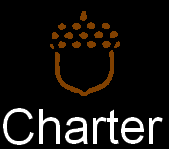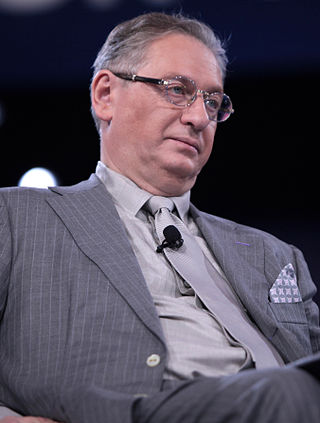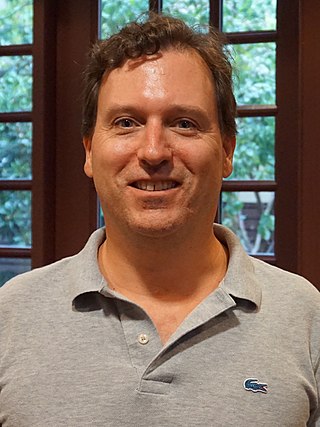Related Research Articles

Morgan Stanley is an American multinational investment bank and financial services company headquartered at 1585 Broadway in Midtown Manhattan, New York City. With offices in 41 countries and more than 75,000 employees, the firm's clients include corporations, governments, institutions, and individuals. Morgan Stanley ranked No. 61 in the 2023 Fortune 500 list of the largest United States corporations by total revenue and in the same year ranked #30 in Forbes Global 2000.
The Wall Street Journal (WSJ), also referred to simply as the Journal, is an American business- and economic-focused international daily newspaper based in New York City. The Journal is published six days a week by Dow Jones & Company, a division of News Corp. The newspaper is published in broadsheet format and online. The Journal has been printed continuously since its inception on July 8, 1889, and is regarded as a newspaper of record, particularly in terms of business and financial news. The newspaper has won 39 Pulitzer Prizes, the most recent in 2023.

Armand Hammer was an American business manager and owner. He spent decades with Occidental Petroleum in the mid 20th century. Called "Lenin's chosen capitalist" by the press, he was also known for his art collection and his close ties to the Soviet Union.

The Goldman Sachs Group, Inc. is an American multinational investment bank and financial services company. Founded in 1869, Goldman Sachs is headquartered in Lower Manhattan in New York City, with regional headquarters in many international financial centers. Goldman Sachs is the second largest investment bank in the world by revenue and is ranked 55th on the Fortune 500 list of the largest United States corporations by total revenue. In Forbes Global 2000 2023, Goldman Sachs ranked 34th. It is considered a systemically important financial institution by the Financial Stability Board.

Shukri Mohammed Ghanem was a Libyan politician who was the General Secretary of the General People's Committee of Libya from June 2003 until March 2006 when, in the first major government re-shuffle in over a decade, he was replaced by his deputy, Baghdadi Mahmudi. Ghanem subsequently served as the Minister of Oil until 2011. On 29 April 2012, his body was found floating on the New Danube, Vienna.

Occidental Petroleum Corporation is an American company engaged in hydrocarbon exploration in the United States, and the Middle East as well as petrochemical manufacturing in the United States, Canada, and Chile. It is incorporated under the Delaware General Corporation Law and headquartered in Houston. The company ranked 183rd on the 2021 Fortune 500 based on its 2020 revenues and 670th on the 2021 Forbes Global 2000.

This Pulitzer Prize has been awarded since 1942 for a distinguished example of reporting on national affairs in the United States. In its first six years (1942–1947), it was called the Pulitzer Prize for Telegraphic Reporting – National.
Robert Lee Vesco was an American criminal financier. After several years of risky investments and dubious credit dealings, Vesco was alleged to have committed securities fraud. He immediately fled the ensuing U.S. Securities and Exchange Commission investigation by living in a number of Central American and Caribbean countries.
George Bradford Cook, also known as G. Bradford Cook and Brad Cook, was an American lawyer who served as chairman of the U.S. Securities and Exchange Commission in 1972. He resigned after being caught up in the Robert Vesco securities fraud scandal and received temporary disbarments in two states for lying to a grand jury in the case.
Gretchen C. Morgenson is an American Pulitzer Prize-winning journalist notable as longtime writer of the Market Watch column for the Sunday "Money & Business" section of The New York Times. In November, 2017, she moved from the Times to The Wall Street Journal.
James V. Grimaldi is an American journalist, investigative reporter, and Senior Writer with the Wall Street Journal. He has been awarded the Pulitzer Prize three times, for investigative reporting in 1996 with the staff of the Orange County Register, in 2006 for his work on the Jack Abramoff lobbying scandal while working for The Washington Post, and in 2023 with the staff of the Wall Street Journal for its capital assets series.

Mark J. Penn is an American businessman, pollster, political strategist, and author.
Charles Gasparino is an American journalist, blogger, and occasional radio host. He frequently serves as a panelist on the Fox Business Network program segment The Cost of Freedom and the stocks/business news program Cashin' In.

The Charter Company of Jacksonville, Florida was a conglomerate with more than 180 subsidiaries that was in the Fortune 500 for 11 years beginning in 1974 and ranked 61st in 1984. The company filed for bankruptcy protection in late 1984, eventually selling off all of its businesses and purchasing Spelling Entertainment Inc. to form Spelling Entertainment Group Inc in 1992.

David Boris Rivkin Jr. is an American attorney, political writer, and conservative media commentator on matters of constitutional and international law, as well as foreign and defense policy. Rivkin has gained national recognition as a representative of conservative viewpoints, frequently testifying before congressional committees, and appearing as an analyst and commentator on a variety of television and radio stations. He is a visiting fellow at the Center for the National Interest, and a recipient of the U.S. Naval Proceedings Annual Alfred Thayer Mahan Award for the best maritime affairs article. He is a fellow at the Foundation for Defense of Democracies, and is a former member of the Sub-Commission on the Promotion and Protection of Human Rights of the United Nations Commission on Human Rights.
Mark Maremont is an American business journalist with the Wall Street Journal. Maremont has worked on reports for the Journal for which the paper received two Pulitzer Prizes.

Jesse Eisinger is an American journalist and author. Winner of the Pulitzer Prize for National Reporting in 2011, he currently works as a senior reporter for ProPublica. His first book, The Chickenshit Club: Why the Justice Department Fails to Prosecute Executives, was published by Simon & Schuster in 2017.

John Carreyrou is a French-American investigative reporter at The New York Times. Carreyrou worked for The Wall Street Journal for 20 years between 1999 and 2019 and has been based in Brussels, Paris, and New York City. He won the Pulitzer Prize twice and is well known for having exposed the fraudulent practices of the multibillion-dollar blood-testing company Theranos in a series of articles published in The Wall Street Journal.
Monroe William ("Bud") Karmin was an American journalist. He won a Pulitzer Prize in 1967 when working as an investigative reporter for the Wall Street Journal. He also worked at different times for The Chicago Daily News,The Chicago Sun-Times, and Newsday.
Jessica Silver-Greenberg is a business reporter for The New York Times whose investigative reporting on consumer financial issues has been cited in the U.S. Supreme Court and the U.S. Congress.
References
- 1 2 Taft, William H. (July 16, 2015). Encyclopedia of Twentieth Century Journalists. Routledge. p. 460. ISBN 978-1-317-40324-1 . Retrieved November 21, 2016.
- 1 2 3 4 5 Brennan, Elizabeth A.; Clarage, Elizabeth C. (1999). Who's who of Pulitzer Prize Winners. Greenwood Publishing Group. p. 463. ISBN 978-1-57356-111-2 . Retrieved November 21, 2016.
- ↑ Bagdikian, Ben H. (March 1977). "Woodstein U: Notes on the Mass Production and Questionable Education of Journalists". The Atlantic. Retrieved November 21, 2016.
- 1 2 3 4 Daley, Robert (November 12, 1973). "Super Reporter: The Missing American Hero Turns Out To Be...Clark Kent". New York Magazine. Vol. 6, no. 46. Retrieved November 27, 2016.
- 1 2 David Wallechinsky; Irving Wallace. "History of Newspapers: The Wall Street Journal". trivia-library.com. Archived from the original on July 22, 2011. Retrieved November 24, 2016.
- ↑ Perlstein, Rick (October 31, 2004). "It's, like, heavier than the Sixties, man!". Village Voice. Retrieved November 27, 2016.
- ↑ Kromm, Chris (November 2, 2010). "Why the 'voter fraud' myth won't die". Facing South. Archived from the original on August 7, 2016. Retrieved November 23, 2016.
- ↑ Moss, Laura (May 7, 2012). "What the future looked like way back when". MNN – Mother Nature Network. Retrieved November 27, 2016.
- ↑ O'Connell, Liz (May 6, 2002). "Outside the margin". lubbockonline.com. Lubbock Avalanche-Journal. Retrieved November 27, 2016.
- ↑ Penn, Stanley (February 20, 1969). "Jersey's Mobsters" (PDF). Wall Street Journal. Retrieved November 24, 2016.
- ↑ Penn, Stanley (January 27, 1970). "Mafia Inroads: Business Shares Blame" (PDF). Wall Street Journal. Retrieved November 24, 2016.
- ↑ Julie Salamon; Stanley Penn (May 21, 1981). "Inside Job". www.maebrussell.com. The Wall Street Journal. Archived from the original on March 18, 2016. Retrieved November 27, 2016.
- ↑ Penn, Stanley. (1994). Have I got a tip for you-- and other tales of dirty secrets, political payoffs, and corporate scams: a guide to investigative reporting. New York: Dow Jones. ISBN 1-881944-01-8. OCLC 32314397.

